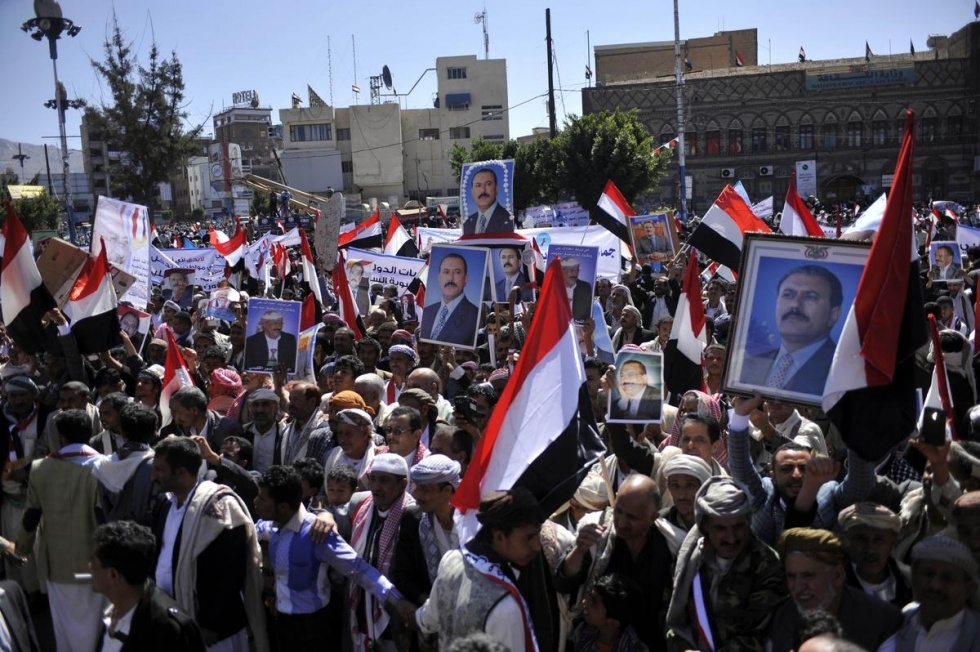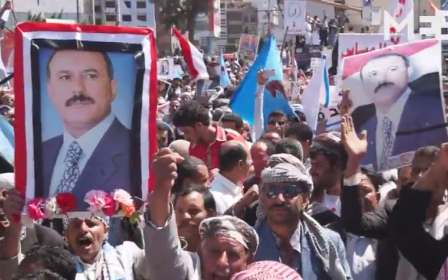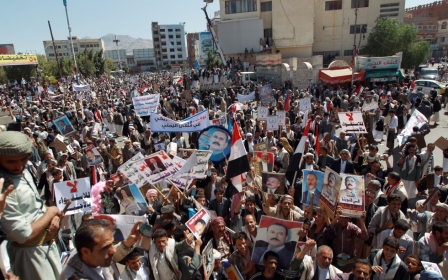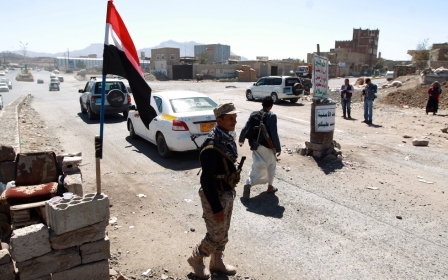Yemen president sacked from party leadership

Yemeni President Abdrabuh Mansur Hadi was dismissed Saturday from the leadership of his party, after being accused of soliciting UN sanctions against his predecessor Ali Abdullah Saleh.
The General People's Congress said it appointed two members to the posts of vice president and secretary general in place of Hadi, who became president after Saleh was forced to resign in February 2012 after a year of bloody protests.
Saleh remains the head of the GPC, which holds 225 seats in Yemen's 301-member parliament. He is accused of being the main backer of the Houthi rebels, who overran the capital unopposed in September, and have since expanded their control to coastal areas and regions south of Sanaa.
Under the 21 September accord, the Houthis were to withdraw from Sanaa and disarm once a neutral prime minister is named.
Earlier Friday, thousands of supporters of former president Saleh and the Shiite rebels took to the streets to protest threatened UN sanctions against the ousted strongman and insurgent chiefs. The GPC party had called for the protests, warning that any sanctions would exacerbate the crisis in Yemen.
The UN Security Council was set to endorse a US-drafted proposal to slap a visa ban and assets freeze on Saleh and two of his allies, Shiite Houthi rebel commanders Abd al-Khaliq al-Houthi and Abdullah Yahya al-Hakim, diplomats in New York said on Tuesday.
The 15 members of the Security Council have until Friday evening to raise objections before the proposal returns to the sanctions committee for action.
The Security Council in August had called on the Houthi rebels to end their armed uprising against Hadi and warned of sanctions against those who threaten the stability of Yemen, a key US ally in the fight against Al-Qaeda.
In an attempt to resolve the crisis, Yemen announced a new 36-member government intended to take the impoverished country out of political deadlock, the state news agency Saba said.
Formation of the new cabinet on Friday, under a peace deal agreed when Houthi rebels seized the capital on 21 September, had been delayed because of tensions between the rebels and their political rivals.
The United States welcomed the formation of the new government, and encouraged the impoverished Arab nation to overcome partisan politics following the weeks of turmoil.
The US National Security Council called on all political actors "to continue to cooperate in the new government," spokeswoman Bernadette Meehan said in a statement.
"This multi-party cabinet must represent the strength of Yemeni unity over individual and partisan interests that may seek to derail the goals of a nation," Meehan said.
The new government includes four women, one of whom takes the information and culture portfolio. Four members of the outgoing cabinet were reappointed and three more changed portfolios.
Career diplomat Abdullah al-Saidi became foreign minister, and the new defence minister is General Mahmud al-Subaihi, who was commander of the 4th Military Region.
Political police chief General Jalal al-Ruishen became interior minister.
On 1 November, the main political parties signed a new agreement, sponsored by UN envoy to Yemen Jamal Benomar, for the formation of a government of technocrats.
Under the accord, representatives of the rebels and their rivals, the Sunni Al-Islah (Reform) Islamic party, mandated President Hadi to form a government and committed to support it.
"It is a compromise agreed to overcome the question of sharing out ministerial portfolios between the various groups" behind the political stalemate, signatory Abdel Aziz Jubari of the liberal Justice and Construction party told AFP at the time.
In the wake of the new agreement, Benomar warned in an interview with AFP that without the rapid formation of a government, tensions between Shiites and Sunnis were likely to increase, sinking the country deeper into crisis.
The turmoil has raised fears that the Arabian Peninsula nation, which neighbours oil-flush Saudi Arabia and lies on the key shipping route from the Suez Canal to the Gulf, may become a failed state.
New MEE newsletter: Jerusalem Dispatch
Sign up to get the latest insights and analysis on Israel-Palestine, alongside Turkey Unpacked and other MEE newsletters
Middle East Eye delivers independent and unrivalled coverage and analysis of the Middle East, North Africa and beyond. To learn more about republishing this content and the associated fees, please fill out this form. More about MEE can be found here.




